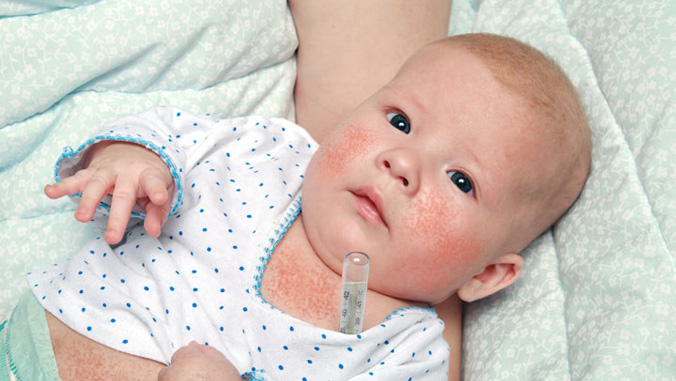Scarlet Fever is much less common than it used to be but in recent years there have been a number of significant outbreaks and it appears we could be in for a re-run.

Figures published by Public Health England Published in May 2017 showed a total of 11,241 notifications were recorded.
It’s hard to discover the figures for Greenwich & Lewisham and the reason for the most recent increase is unclear, however, it’s important to know of the signs and symptoms so that early treatment with antibiotics can be given.
So, we’ve found some important information for you in our handy guide below, but if there is any doubt, please consult your doctor.
Symptoms
Scarlet fever usually follows a sore throat or a skin infection, such as impetigo, caused by particular strains of streptococcus bacteria.
Initially, symptoms usually include a sore throat, headache and a high temperature (38.3C/101F or above), flushed cheeks and a swollen tongue. Which is why some parents can confuse Scarlet Fever with Tonsillitis.
A day or two later the characteristic pinkish rash appears. Usually on the chest and stomach before spreading to other areas like the ears and neck. Symptoms usually develop two to five days after infection, although the incubation period can be as short as one day or as long as seven!
The rash will feel like sandpaper and it may be itchy. On darker skins, the rash may be more difficult to spot although its rough texture should still be apparent.
There’s no evidence to suggest that catching scarlet fever when pregnant will put your baby at risk. However, if you’re heavily pregnant, tell those in charge of your care if you’ve been in contact with someone who has scarlet fever.
How Scarlet Fever spreads
Scarlet fever is very contagious and can be caught by:
• breathing in the bacteria from an infected person’s coughs and sneezes
• touching the skin of a person with a skin infection, like impetigo
• sharing contaminated towels, baths, clothes or bed linen (boil washes please!)
It can also be caught from carriers – people who have the bacteria in their throat or on their skin but don’t have any symptoms.
Who’s affected by Scarlet Fever
Most cases of scarlet fever occur in children under 10. However, people of any age can get the illness. As it’s so contagious, scarlet fever is likely to affect someone in close contact with a person with a sore throat or skin infection. Outbreaks often occur in nurseries and schools where children are in close contact with one another!
Symptoms will only develop in people susceptible to toxins produced by the streptococcus bacteria.
Most children over 10 years of age will have developed immunity to these toxins. It’s also possible to catch scarlet fever more than once, but this is rare.
Treating Scarlet Fever
Thankfully Scarlet fever usually clears up after about a week. It used to be a very serious illness, but nowadays most cases tend to be mild and treated with antibiotics. Liquid antibiotics, such as penicillin or amoxicillin, are often used to treat children. These must be taken for 10 days, even though most people recover after four to five days.
It’s important to be aware that your child will still be infectious for 24 hours after antibiotic treatment has begun, and therefore they shouldn’t attend nursery or school during this period Without antibiotic treatment, your child will be infectious for 1-2 weeks after symptoms appear. Complications of scarlet fever can include ear infection, sinusitis, or pneumonia.
There is no vaccine for Scarlet Fever.
Children and adults should cover their mouth and nose with a tissue when they cough or sneeze and wash their hands with soap and water after using or disposing of tissues. Avoid sharing contaminated utensils, cups and glasses, clothes, baths, bed linen or towels.
* The information on Scarlet Fever contained in the piece was taken from NHS Choices and www.nhs.uk. You must not rely on the information on Greenwichmums as an alternative to medical advice from your doctor or other professional healthcare providers. If you have any specific questions about any medical matter, you should consult your doctor or another professional healthcare provider. If you think you may be suffering from any medical condition, you should seek immediate medical attention and you should never delay seeking medical advice, disregard medical advice or discontinue medical treatment because of information on Greenwichmums.

You must be logged in to post a comment.